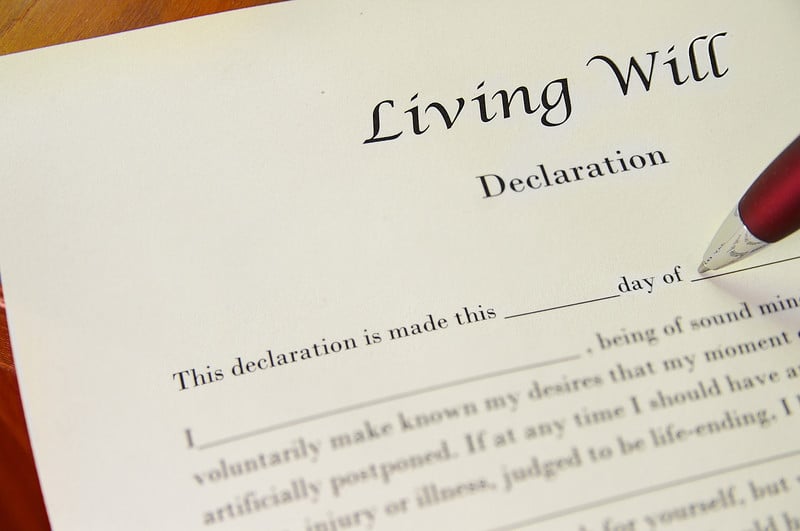
© Can Stock Photo Inc. / zimmytws
Did you know you have a legal right to refuse medical treatment that may delay death by creating a living will? Consider how you would like end-of-life medical care to be handled in the case of a terminal condition where you may be incapacitated and unable to communicate your wishes. A Living Will allows you to express your right to refuse death-delaying procedures if you are unable to express them verbally.
What is a living will? A living will, also called an advanced directive or directive to physicians, is a document directing your end-of-life medical care. It is not a last will and testament where you provide for distribution of property upon death. In fact, a living will does not have the power to guide any decisions regarding an individual’s estate. A Living Will is a document by which the Illinois Legislature has recognized the right of individuals to control their medical care through a written and witnessed declaration that includes the decision to withhold or withdraw death-delaying procedures in the case of a terminal condition.
It is important to understand what a terminal condition and death-delaying procedures are according to the Illinois Living Will Act. Illinois law defines a terminal condition as an incurable and irreversible condition as determined by an attending physician when death is imminent and death-delaying procedures would only prolong dying. Death-delaying procedures would be any medical procedure or intervention that, in the attending physician’s opinion, would only postpone death. For example, an attending physician’s opinion under particular circumstances may be that assisted ventilation, blood transfusions, or tube feeding may only postpone or delay death.
The Illinois Living Will Act sets forth requirements by which the written declaration becomes a living will. It provides that a living will be documented in an individual’s medical record. The person making the declaration, i.e. declarant, must be of sound mind and of the age of majority (18) or emancipated according to the Emancipation of Minors Act. The declaration, or living will, must be signed by the declarant in front of two witnesses, who are also 18 years or older. Finally, if the individual is able, the individual should make the physician aware of the existence of a living will.
An individual may revoke a living will at any time regardless of mental state or physical condition. A living will may be revoked in one of three ways: by destroying the document with intent to cancel; by written revocation; or by oral or other expression of intent to cancel before a witness of 18 years or older. Once the attending physician is aware that a living will has been revoked, the attending physician should document it in the declarant’s medical record. The declarant’s wishes at all times will take precedence over the Living Will.
Consider the following hypothetical situation: Mr. Smith has a living will, suffers cardiac arrest, and goes into a coma. The attending physician, Dr. Jones, is aware of the living will and documented it in the Mr. Smith’s medical record. Dr. Jones has diagnosed Mr. Smith’s condition as irreversible and terminal. Mr. Smith stated that he may receive pain medication to ease suffering. However, he does not want to have medical procedures or interventions that delay death such as cardiopulmonary resuscitation (CPR) or a ventilator. Mr. Smith’s condition declines, and he will not be able to breath on his own without a ventilator. According to Mr. Smith’s Living Will, the ventilator would be considered a death-delaying procedure or intervention. Therefore, Dr. Jones should not prolong Mr. Smith’s life by using the ventilator.
A thought may have crossed your mind that a living will sounds like a power of attorney (POA) for health care. The two do over lap. A Living Will is only effective once your condition is terminal as determined by your treating physician and is a written declaration between you and your physician regarding artificial means to postpone the moment of death. A POA for health care has much broader application in that it provides an agent with the power to act on your behalf when you may be incapacitated, but your condition is not necessarily terminal at that time. If there is a POA for health care in effect, the Living Will does not not operate if the agent is available and authorized to deal with life-sustaining or death-delaying procedures under the POA, but a Living Will is a good back up to a health care POA.
By Margret M. Leuthold Guest writer for the Drendel & Jansons Law Group
- Drendel & Jansons Law Group
- 111 Flinn St.
- Batavia Illinois, 60510
- 630-523-0543
- www.batavialaw.com
- www.foxvalleyestateplanning.com
If you are interested in discussing a living will or other estate planning options, please contact us. We would love to help you.
For more articles on estate planning, visit the Drendel & Jansons Estate Planning Blog; for articles on Family law topics, visit the Drendel & Jansons Family Law Blog; and for articles on various topics of law, visit the main Drendel & Jansons Law Group Blog.
